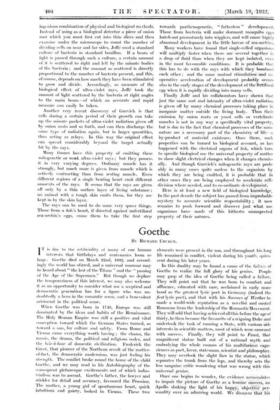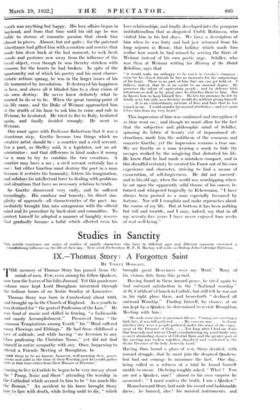Goethe
By RICHARD CHURCH.
1't' is due to the artificiality of many of our human I interests that birthdays and centenaries loom so large. Goethe died on March '22nd, 1832, and accord- ingly the world has stirred, and a universal murnmr may he heard about " the last of the Titans " and the " passing of the Age of the Supermen." But though we deplore the temporariness of this interest, we may also welcome
it as an opport t 'ty to consider what use a sceptical and mocratie generation has for a figure who was an- ht.,Ily a hero in the romantic sense, and a benevolent aristocrat in the political sense.
When Goethe was born in 1749, Europe was still dominated by the ideas and habits of the Renaissance. The Holy Roman Empire was still a positive and vital coneeption toward which the German States turned, as toward it sun, for culture and safety. From Rome and Vienna came everything worth having ; the charm, the mush., the drama, the political and religious codes, and the brie-a-brae of domestic civilization. Frederick the Great, that pioneer of the Northern revolt of the matter- of- fact, the democratic modernism, was just feeling his strength. The conflict broke round the home of the child Goethe, and we may read in his Autobiography of the consequent picturesque excitements out of which indus- trialism was to ascend. Goethe's father, the lawyer and stickler for detail and accuracy, favoured the Prussian. The mother, a young girl of spontaneous -heart, quick intuitions and gaiety; lObked to Vienna. • These two
elements were present in the son, and throughout his long life remained in conflict, violent during his youth, quies- cent during his later years.
In this duality may be found a cause of the failure of Goethe to realize the full glory of his genius.- People may gasp at the idea of Goethe being called a failure. They will point out that he was born to comfOrt and affluence, educated with care, acclaimed in early man.;. hood as the greatest lyric poet in Germany (indeed the first lyric poet), and that with his Sorrows of Werther he made a world-wide reputation as a novelist arid ousted Rousseau front the leadership of the Romantic Movement. They will add that having achieved all this before the age of thirty, he then became the favourite of a reigning Duke and undertook the task of running a State, with various -side interests in scientific matters, most of which were exam-tied with success. Finally, they will point to Faust, that magnificent statue built out of a national myth-and embodying the whole cosmos of his multifarionS expe- iiences as poet, lover, statesman, scientist and philosopher. They may overlook the slight flaw in the statue, which separates the trunk from the legs, and thereby Sets the less sanguine critic wondering what was wrong with this universal' genius.
Once one begins to wonder, the evidence aciutwlates to impair he picture of Goethe as a leonine si,i&e.;>, an Apollo shaking the light of hiS haPpY, 'objeetiW per- sonality over an admiring world. We discoVerDisit his
youth wasany-thing but happy. His love affairs began in boyhood, and from that time until his old age he was liable to storms of romantic passion that shook him almost to pieces. Almost, but not quite ; for the paternal inheritance had gifted him with a caution and reserve that made him draw back at the last moment, to seek fresh woods and pastures. new away from the influence of the loved object, even though he was thereby stricken with remorse for the hearts he had broken. In spite of the spontaneity out of which his poetry and his most charac- teristic actions sprang, he was in the larger issues of his life tormented by irresolution. It destroyed his happiness in love, and above all it blinded him to a clear vision of his own destiny. He never knew definitely what he wanted to do or to be. When the great turning-point of his life came, and the Duke of Weimar approached him it the zenith of his fame to ask him to conic and rule in %%rein:tar, he hesitated. He tried to flee to Italy, hesitated again, and finally decided wrongly. He went to Weimar. .
One must agree with Professor Robertson that it was a disastrous step. Goethe became two things which no creative artist should be : a courtier and a civil servant. For a poet, as Shelley said, is a legislator, not an ad- ministrator : and that difference in kind makes it wrong for a man to try to combine the two vocations. A .'nuttier may have a use ; a civil servant certainly has a use : but either function must destroy the pm' in a man because it restricts his humanity, fetters his imagination, ;aid subdues his intellectual force to dealing with problems and,situations that have no necessary relation to truth.
So :Goethe discovered very early, and he suffered tiecOrdingly. His candour and honesty, his direct sim- plicity of approach—all characteristics of the poet—im- ffipcliately brought him, into antagonism with the official mind and its procedure by back-stair and committee. To protect himself lie adopted a manner of haughty reserve that gradually became a habit which affected even his
love-relationships, and finally developed into the pompous institutionalism that so ,disgusted Crabb Robinson, who visited him in his last days. We have a description of him when he was forty and had just returned from his long sojourn in Rome, that holiday which made him realize how much he had missed by serving the State of Weimar instead of his own poetic urge. Schiller, who was then at Weimar writing his History rd the Dutch Rebellion, says that " it would make me unhappy to be much in Coothe's company ; oven for his closest friends he has no moments for the outpourings of his heart. There is no part of him that one can get hold of. I believe, indeed, that he is an egoist. to an unusual degree. He possesses the talent of captivating people ; and by delicate little attentions as well as by great ones ho attaches them to him.' But he knows how to keep himself free. Ho lets his presence be felt by kindly acts, but only as a divinity would do, without giving himself. . . . . It is an extraordinary mixture of love and hate that he has roused in me. I could murder his mental attributes ; and yet again 1 love him from my very heart."
This impression of bins was confirmed and strengthenA as time went on ; and though we must allow for the fad. that the subjective and philosophic mind of Schiller, spinning its fabric of beauty ot:t of impassioned ab- stractions, made him the antithesis of the sensuous and. concrete -Goethe, yet the impression remains a true one. We see Goethe as a man wearing a mask to hide the ravages worked by the misgiving that distorted his life. He knew that he had made a mistaken compact, and in this dreadful certainty he created his Faust out of his own experience and character, striving to find it means of exoneration, of self-forgiveness. He (lid not succeed and in his old age, when the world VMS worshipping where. he sat upon the apparently solid throne of his career, lie. turned and whispered tragically to Eekermann, "I have always been praised as a man especially favoured by fortune. Nor will I complain and make reproaches about the course of my life. But at bottom it has been nothing but toil anti trouble, and I may, indeed, say that in alt' my seventy-five years 11 have never enjoyed four weeks • Of real well-being."







































 Previous page
Previous page